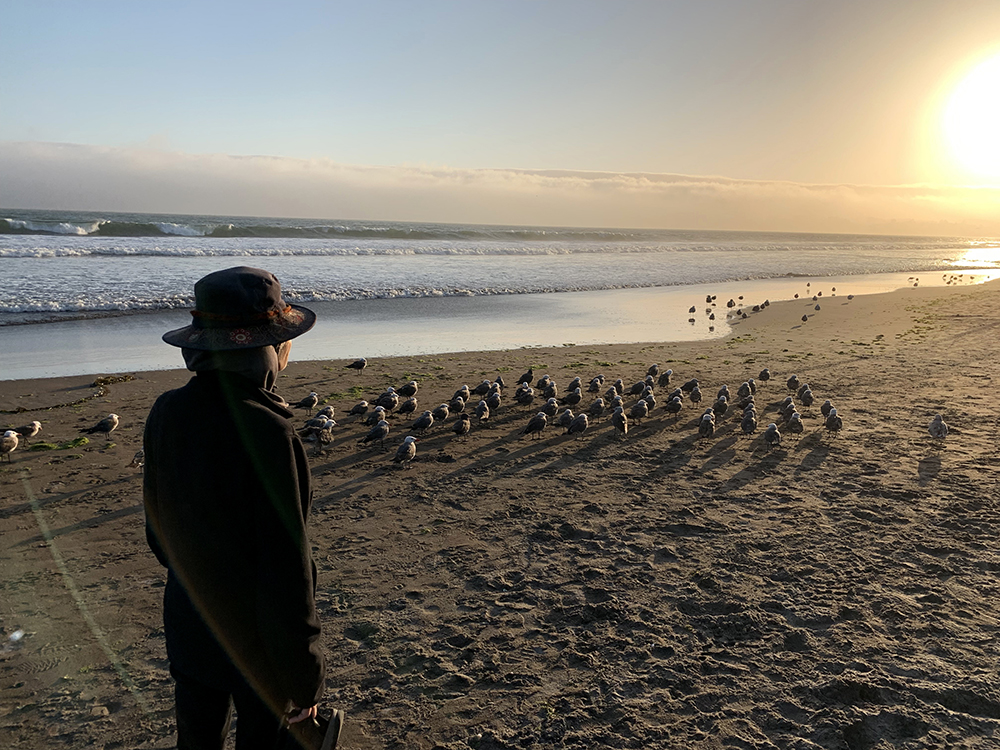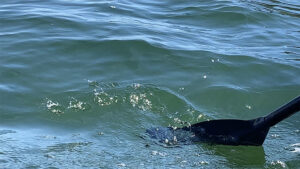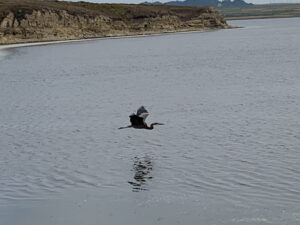 Life is what happens to you while you’re busy making plans.
Life is what happens to you while you’re busy making plans.
—John Lennon
We slid our two-person kayak into Drake’s Estero and, one at a time, edged into our seats butt first, as if getting into a buoyant sports car, myself in front and Tom in back. Early morning fog, cool and moist, heavy with the smell of brine, blanketed the estuary. The gray-green water was translucent and so shallow that we could see the bottom littered with broken oyster shells.
My husband and I had been counting the days until we could escape to this Northern California estuary 30 miles north of San Francisco. Two weeks at Point Reyes seashore in an Airbnb cottage would provide perfect sanctuary from the heat, smoke and fear of wildfires that summer brings to the Sierra foothills. September had been a trauma trigger for both of us since my land, home, and art studio had been destroyed in the Butte Fire six years earlier.
 We found our rhythm as we paddled in that altered state when time and distance loosen their hold. My body began to relax. I thought about the quote from Isak Dinesen, the cure for anything is salt water: sweat, tears, or the sea. I felt bathed in all three.
We found our rhythm as we paddled in that altered state when time and distance loosen their hold. My body began to relax. I thought about the quote from Isak Dinesen, the cure for anything is salt water: sweat, tears, or the sea. I felt bathed in all three.
The sun was high when we beached the kayak for lunch in the shade of a sandstone cliff. With only the presence of a flotilla of pelicans, we stripped off our clothes and ran into the water, but it was too shallow for swimming.
Undaunted, we rolled over on our backs and floated in blissful mindlessness. Feeling refreshed, we headed for the open sea. Time and tide were with us, but we’d be fighting wind on the way back.
We came so close to our destination that I could see the narrow inlet in the distance, but a sandbar blocked our way. I felt like a child who had to go home before the party was over. The water was only two feet deep, so we sloshed through it, pulling the kayak behind us. Then we began the long paddle home. About two miles from where we launched, one of the support straps on Tom’s seat broke. He continued paddling heroically. But by the time we beached, tied the kayak on top of the car, and drove home to our cottage, he was in excruciating pain.
I thought, “That’s okay. We can still hike,” but a sense of déjà vu dampened my optimism. Five years ago, Tom injured his back and could barely walk for weeks. Was this happening again?
After two days of Advil, back stretches, and a massage with CBD oil, he felt better. We decided to hike the Abbots Lagoon Trail, an easy 3 ½ miles to the ocean. We felt a renewed sense of adventure.
The trail meandered through pastureland. Dairy cows glanced indifferently at us as they nosed among clumps of dry grass looking for anything green to eat. We crossed over a wooden bridge where the lagoon narrowed, followed the path to a vast swath of white sand beach, and walked barefoot at the edge of the surf before turning back. The sun was already low on the horizon.
 Following the curve of the lagoon, we suddenly halted to witness a blue heron balancing on one leg like a water ballerina. Further down the trail, a small cottontail hopped out of the bushes looking as if it had escaped from a toy store. When it heard our foot-steps, it disappeared. Minutes later, I caught sight of a slender, deep-brown garter snake with sunburst-yellow racing stripes slithering through the brush. At the end of our hike, we spotted the parking lot in the distance. A coyote loped across the trail. The magic of nature enveloped us.
Following the curve of the lagoon, we suddenly halted to witness a blue heron balancing on one leg like a water ballerina. Further down the trail, a small cottontail hopped out of the bushes looking as if it had escaped from a toy store. When it heard our foot-steps, it disappeared. Minutes later, I caught sight of a slender, deep-brown garter snake with sunburst-yellow racing stripes slithering through the brush. At the end of our hike, we spotted the parking lot in the distance. A coyote loped across the trail. The magic of nature enveloped us.
I thought, “This is good. Everything’s gonna be okay.”
The next morning Tom gently shook me. “Sweetheart…I’m so sorry to wake you up, but I’ve been in atrial fibrillation since midnight. I took my heart meds but they’re not working. Will you listen to my heart? A normal heartbeat is strong and steady, THUMP-THUMP, THUMP-THUMP, THUMP-THUMP. Tom’s sounded like this: thump, thump-thump-thump, thump-thump, with irregular intervals between beats. A-fib affects people differently. Some hardly notice it. But for Tom, even walking up a flight of stairs leaves him breathless.
We needed to go to the ER. Everything was not okay.
I rolled out of bed and threw on jeans and a t-shirt while Tom googled directions to the nearest hospital, Marin General, forty-five-minutes away. Tom drove. We were quiet, each in our own thoughts. The last time this happened, we went to our local hospital. I stayed with Tom during the cardio-vert, a procedure to put the heart back into rhythm. A visual memory flashed in my mind. Tom being put out. The paddles. The shock that seemed to run through his whole body. The time it took for him to come back—only seconds—but it seemed like forever
We found visitor parking, donned our masks, and walked to the entrance.
The guard looked at me and said, “Only the patient can go in. COVID rules.”
Oh yeah, how could I forget? I gave Tom a masked kiss, “I love you. Call me when you know something,” and walked back to the car to wait.
He called an hour later. “The ER doc is an asshole and the cardiologist is with another patient. Why don’t you go to that shopping center in Greenbrae and get something to eat? I’ll call you when I know what’s happening.”
After six hours in the ER, Tom checked out still in a-fib. The cardiologist wanted to wait a few days to see if he could heal on his own before doing the cardio-version. No hiking. No kayaking.
Tom was cardioverted four days later. The next morning, I woke up to a new man, his energy and good spirits restored by the flick of an electric switch. I felt exhausted. I thought I’d been coping pretty well, but just below my calm surface, sadness and disappointment simmered, and something else. Was it fear? Anger?
Tom sensed something was wrong and asked, “What’s going on with you?”
I wanted to say, “I’m okay. Let’s just enjoy the time we have left.” Before I could get the words out, something broke open and my zen equanimity, my longtime wifely role, lay shattered in the pit of my stomach. I started to cry. “I’m so scared. I’m not ready to go back to work. And we haven’t had enough time. I want our vacation back.” I was afraid that Tom would think I was blaming him.
But instead he held me and said, “I understand. Let’s talk.”
And we did.

Beautiful; writing; Yes” Let’s enjoy what ever time have left”; Stay well.
NdrU
Oh, Sharon, what a saga for you both – a real example of “life is what happens when you had other plans.” I was much relieved that the cardo-vert was so effective, but what a slow and worrying lead-up, wasting your precious vacation time. You take us into this story so sweetly, letting us breathe the Point Reyes air and take in its light and wildlife along with you, so I really felt bereft on your behalf when it was all snatched away.
I hope another vacation opportunity magically presents itself for you before too long – and not one almost “empty” of pleasures! I’ve always found the word “vacation” puzzling, as it’s a time that’s ideally packed full of life-enhancing experiences – though emptying the mind of everyday stresses and work is definitely a positive thing. Wishing you some relaxing autumn days at home, at least. Love to you both, Diana
Quite a story, Sharon. A “less than pleasant” reminder of how the universe laughs whenever humans make plans or have expectations. I am so glad it turned out as well as it did. Love to you and Tom, Maryann
A remarkable pairing of ascendant human beings. But the emotions are real and cannot (and more importantly, should not) be denied.
The aches and pains of advancing old age, definitely not for the faint of heart. I don’t mean to diminish a-fib into a category of aches and pains. It is more life threatening than that, I know.
Love will carry the hour and day…but there is always room for “feeling intensely” … something both of you are very adept at doing.
Glad you were able to ‘talk’ about it. Communications providing continuity and a road map back to your Zen equanimity.